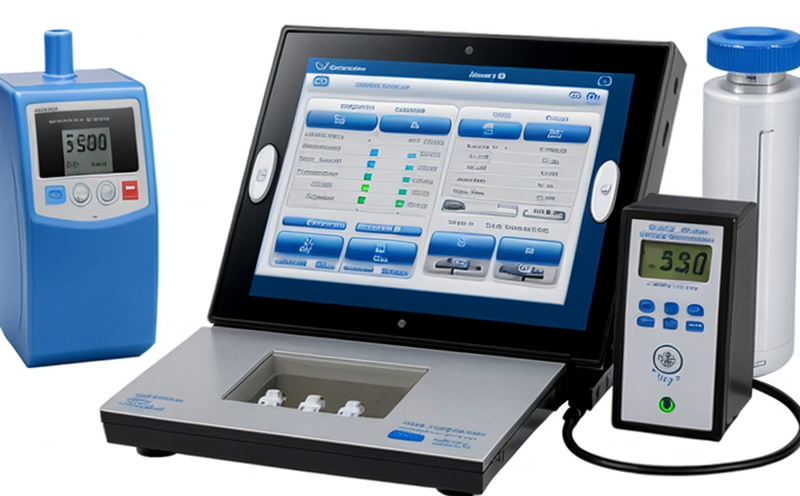Infusion Pump Software Verification and Validation Testing
The verification and validation of infusion pump software is a critical aspect of ensuring medical device safety and efficacy. As quality managers and compliance officers, you must ensure that the software meets regulatory standards such as ISO 14971 for risk management and IEC 62304 for software lifecycle processes. This service involves a comprehensive approach to verify that the software functions correctly under all specified conditions and validate its safety and effectiveness in real-world scenarios.
The process begins with thorough documentation of requirements, which are then verified against actual implementation using static analysis tools such as Coverity or SonarQube. These tools help identify potential vulnerabilities early in the development cycle, reducing costly rework later on. The next step is dynamic testing, where the software is executed under various conditions to ensure it behaves correctly and predictably.
Validation involves simulating real-world usage scenarios through rigorous testing protocols that mimic patient interactions with the device. This includes stress tests, fatigue tests, and usability studies conducted by trained personnel who simulate actual user behavior. Compliance officers can rely on these results to demonstrate adherence to FDA regulations like QSR (Quality System Regulation) and EU MDR requirements.
The use of advanced simulation software allows us to create highly realistic test environments that replicate the conditions under which the infusion pump will operate in clinical settings. By doing so, we can identify any issues before they become critical problems during deployment. Additionally, our team works closely with R&D engineers throughout the process to ensure that all necessary features are included and that there is no overlap or gap in functionality.
Finally, comprehensive reporting of findings is provided at every stage of testing, ensuring transparency between stakeholders involved in bringing this technology to market safely and effectively. Our reports not only detail what was tested but also provide recommendations for improvement based on observed results.
- Static Analysis: Use of Coverity or SonarQube to identify potential vulnerabilities early
- Dynamic Testing: Execution under various conditions to ensure correct and predictable behavior
- Validation: Simulation of real-world usage scenarios through rigorous testing protocols
- Comprehensive Reporting: Detailed findings at each stage with recommendations for improvement
In summary, our infusion pump software verification and validation testing service provides a robust framework for ensuring that your device meets all relevant standards while minimizing risks associated with improper functionality. By leveraging state-of-the-art tools and methodologies, we deliver reliable evidence supporting successful regulatory submissions.
Why It Matters
The importance of thorough verification and validation cannot be overstated when it comes to medical devices such as infusion pumps. These devices are responsible for delivering life-saving medications directly into patients' veins or abdomens, making their accuracy and reliability paramount.
- Patient Safety: Ensuring that the software delivers accurate dosages ensures patient safety
- Regulatory Compliance: Meeting FDA QSR and EU MDR requirements is essential for market entry
- Risk Management: Identifying potential issues early in development reduces costly rework later on
- User Experience: Simulating real-world usage scenarios helps improve the overall user experience of the device
Without proper verification and validation, there could be significant risks to patient health. For instance, if an infusion pump delivers incorrect dosages due to software errors, it could lead to severe complications or even death. Therefore, ensuring that the software is thoroughly tested before clinical use is crucial.
Compliance with regulatory standards not only helps avoid legal penalties but also enhances your reputation as a trustworthy manufacturer of quality medical devices. Additionally, demonstrating robust validation processes can build confidence among healthcare providers who rely on these devices for patient care.
The user experience plays a vital role in the success of any medical device. By simulating real-world usage scenarios through rigorous testing protocols, we ensure that the software is intuitive and easy to use, leading to better outcomes for both patients and healthcare professionals.
Eurolab Advantages
At Eurolab, our commitment to excellence in medical device testing sets us apart from other providers. With years of experience in this field, we have built a reputation for delivering accurate, reliable results that meet the highest standards.
- Expertise: Our team consists of highly qualified professionals with extensive knowledge of medical device regulations and best practices
- State-of-the-Art Facilities: Equipped with cutting-edge equipment to perform comprehensive testing
- Comprehensive Services: From initial design reviews through final inspections, we offer full lifecycle support for your devices
- Rapid Turnaround Times: Efficient processes allow us to complete tests quickly without compromising on quality
- Cost-Effective Solutions: Tailored packages that provide value while maintaining the highest level of service
- International Recognition: Our certifications and accreditations ensure compliance with global standards
- Dedicated Resources: Our dedicated team works closely with your R&D engineers to ensure seamless integration into your product development process
- Continuous Improvement: We stay up-to-date with the latest industry trends and best practices, ensuring that our services remain relevant and effective.
By partnering with Eurolab for your infusion pump software verification and validation testing needs, you gain access to a wealth of expertise and resources that will help ensure the success of your product. Our goal is to provide you with accurate, reliable results that meet all applicable regulations while minimizing costs and time-to-market.





